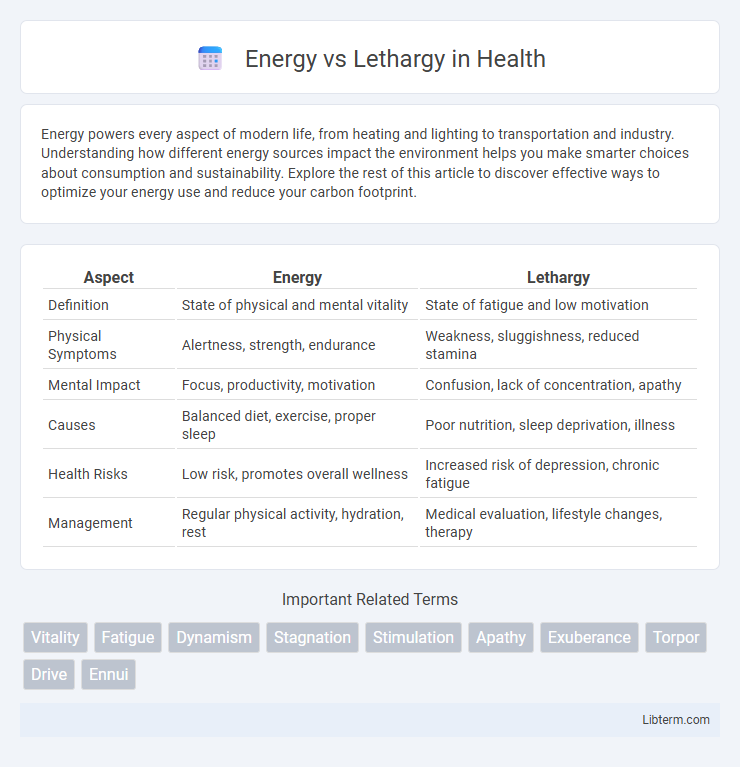Energy powers every aspect of modern life, from heating and lighting to transportation and industry. Understanding how different energy sources impact the environment helps you make smarter choices about consumption and sustainability. Explore the rest of this article to discover effective ways to optimize your energy use and reduce your carbon footprint.
Table of Comparison
| Aspect | Energy | Lethargy |
|---|---|---|
| Definition | State of physical and mental vitality | State of fatigue and low motivation |
| Physical Symptoms | Alertness, strength, endurance | Weakness, sluggishness, reduced stamina |
| Mental Impact | Focus, productivity, motivation | Confusion, lack of concentration, apathy |
| Causes | Balanced diet, exercise, proper sleep | Poor nutrition, sleep deprivation, illness |
| Health Risks | Low risk, promotes overall wellness | Increased risk of depression, chronic fatigue |
| Management | Regular physical activity, hydration, rest | Medical evaluation, lifestyle changes, therapy |
Understanding the Basics: Energy vs Lethargy
Energy represents the vital force that fuels physical and mental activities, enabling alertness, motivation, and productivity. Lethargy, on the other hand, manifests as a state of sluggishness, decreased energy levels, and impaired cognitive function, often resulting from factors like poor nutrition, inadequate sleep, or underlying health conditions. Understanding these basic distinctions helps in identifying lifestyle changes and interventions that restore optimal energy balance and improve overall well-being.
Causes of High Energy Levels
High energy levels often result from factors such as regular physical exercise, balanced nutrition rich in complex carbohydrates and proteins, and adequate hydration. Hormonal influences, including elevated adrenaline or thyroid hormone levels, also contribute to increased vitality and alertness. Quality sleep patterns and effective stress management further enhance sustained high energy throughout the day.
Common Triggers of Lethargy
Common triggers of lethargy include poor sleep quality, inadequate nutrition, and chronic stress, all of which disrupt the body's natural energy production. Sedentary lifestyles and dehydration further diminish physical and mental alertness, reducing overall vitality. Hormonal imbalances such as hypothyroidism and vitamin deficiencies like low B12 levels also significantly contribute to persistent fatigue.
The Role of Nutrition in Energy and Lethargy
Proper nutrition plays a crucial role in regulating energy levels and preventing lethargy by providing essential nutrients such as complex carbohydrates, proteins, and vitamins that support metabolic processes and sustained energy release. Deficiencies in key nutrients like iron, magnesium, and B vitamins can lead to fatigue and low energy, impairing cognitive and physical performance. Balanced meals with adequate hydration contribute to maintaining stable blood sugar levels, optimizing mitochondrial function and reducing feelings of exhaustion throughout the day.
Exercise: Boosting Vitality and Fighting Fatigue
Exercise significantly enhances energy levels by improving cardiovascular health, increasing endorphin production, and boosting mitochondrial function within muscle cells. Regular physical activity combats lethargy by promoting better sleep quality, reducing inflammation, and regulating blood sugar levels. Incorporating aerobic workouts, strength training, and flexibility exercises optimizes vitality and mitigates chronic fatigue symptoms effectively.
Mental Health's Impact on Energy
Mental health significantly influences energy levels, where conditions like depression and anxiety often lead to chronic fatigue and diminished motivation. Neurochemical imbalances impact brain function, reducing mental clarity and physical vitality, thereby exacerbating feelings of lethargy. Addressing mental health through therapy, medication, and lifestyle changes can restore energy balance and improve overall well-being.
Sleep Quality: Key to Overcoming Lethargy
High-quality sleep significantly enhances energy levels by promoting cellular repair and cognitive function. Poor sleep quality disrupts circadian rhythms, leading to increased fatigue and reduced alertness. Prioritizing consistent sleep schedules and creating a restful environment are essential strategies to overcome lethargy and maintain sustained energy throughout the day.
Stress Management for Sustained Energy
Effective stress management techniques, such as mindfulness meditation and regular physical exercise, play a crucial role in maintaining sustained energy levels throughout the day. Chronic stress triggers the release of cortisol, which depletes energy reserves and leads to lethargy and fatigue. Incorporating balanced nutrition, adequate sleep, and relaxation practices supports adrenal health, reducing stress-induced energy crashes and enhancing overall vitality.
Lifestyle Habits That Drain or Enhance Energy
Lifestyle habits significantly influence energy levels, with poor sleep patterns, excessive screen time, and sedentary behavior draining vitality and promoting lethargy. In contrast, regular physical activity, balanced nutrition rich in whole foods, and consistent hydration enhance energy by supporting metabolic efficiency and cognitive function. Stress management techniques such as mindfulness and adequate rest further replenish energy reserves, fostering sustained mental and physical alertness.
Strategies to Shift from Lethargy to High Energy
Implementing consistent physical activity, such as brisk walking or stretching, stimulates blood flow and boosts overall energy levels. Prioritizing balanced nutrition rich in protein, omega-3 fatty acids, and complex carbohydrates supports sustained vitality and combats fatigue. Establishing a regular sleep routine that ensures 7-9 hours of quality rest enhances cognitive function and facilitates recovery from lethargy.
Energy Infographic

 libterm.com
libterm.com